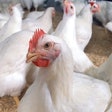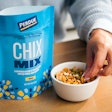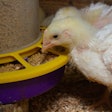Dr. Charles Hofacre, President of the Southern Poultry Research Group, has an optimistic view of the industry’s transition to antibiotic-free production, stating, “We’re going to find ways to be successful in this no antibiotics world.” He spoke to more than 50 attendees of an Adisseo-sponsored dinner held on July 18, in Orlando, FL, as industry professionals from around the world attended the Poultry Science Association annual meeting.
Hofacre touched on what was driving the shift to antibiotic-free (ABF) production, but focused on one of the biggest risks to ABF flocks—necrotic enteritis (NE). “The first growout or two after the change to antibiotic free goes well, but then things start to happen. Performance starts to slip and producers see more necrotic enteritis.” He explained that once you stop using antibiotics, the house bacteria flora doesn’t change overnight. It changes overtime and creates an environment that isn’t so conducive to bird health. “There is actually a greater risk of NE with clean litter,” said Hofacre. “Keeping birds on built-up litter helps maintain the health of flocks.”
Hofacre explained that three things have to occur for NE to break, so by keeping these from occurring healthy intestines can be maintained and NE prevented.
- Control intestinal epithelium damage by managing ingredient quality and Coccidia.
- Prevent toxigenic strains of C. perfringens from multiplying through management of ingredient types and the use of enzymes.
- Maintain healthy intestinal microflora. “We need to learn about the normal shifts in microflora and how to keep it in a normal pattern to help keep birds healthy.”
Farms with poorer husbandry have more instances of NE, according to Hofacre. Items that require careful consideration include:
Feed
“Feed outages are a disaster for ABF operations.” Also, high protein diets and feed changes at the wrong time, particularly at the same time as the reaction is occurring from the coccidia vaccine, can create additional stress and result in higher NE. “Producers need to understand that without antibiotics, we’re going to have feed passage and we will lose a few points in FCR. Also, all veggie diets are a problem. Chickens aren’t vegetarians; they are omnivores.”
Cocci vaccines
Most often, NE breaks at day 16, which is when the peak damage from the cocci vaccine occurs. “We must learn to manage vaccines; currently many producers combine vaccines and a chemical coccidiostat.”
Downtime and density
A minimum 14-day downtime is recommended as shorter downtimes increase the risk of NE. A greater amount of square footage or lower bird density is also needed.
Chick quality
“At one producer, we found that after NE/cocci, the greatest reason for mortality was chick quality. Chick quality and quality of egg pack are critical and demand attention, especially since they’re taking away one of our major tools to keep pathogenic bacterial levels down.”
"Success in ABF is much more dependent on husbandry,” said Hofacre. “A lot of it has to do with change. Antibiotics were allowing us to be less than perfect. Now the grower needs to be a bigger part of the team to find solutions.”
One thing that Hofacre did make clear is that “If 100% of your production is antibiotic-free, that’s not a good thing. Chickens are going to get sick and when they get sick we need to treat them with an antibiotic.”
Hofacre acknowledges that while there is no silver bullet, facing this NE challenge in ABF operations will require the help of various products such as enzymes, probiotics, prebiotics, inorganic acids and others. “It may become that a normal diet routinely includes prebiotics and probiotic to help keep gut health where it needs to be,” said Hofacre.















